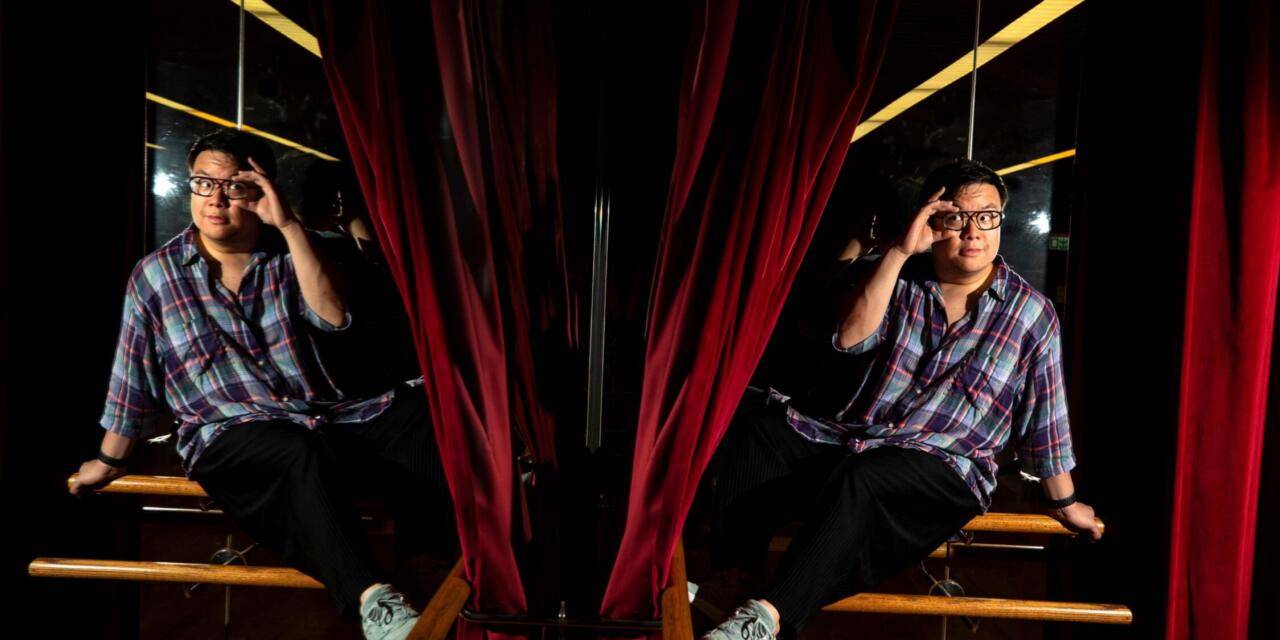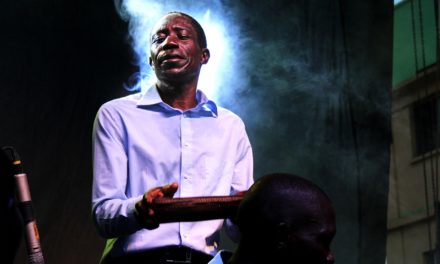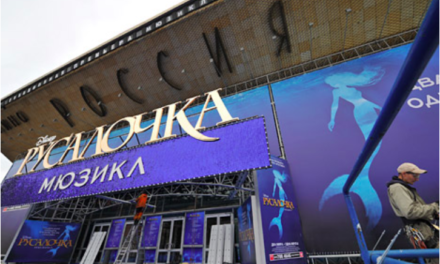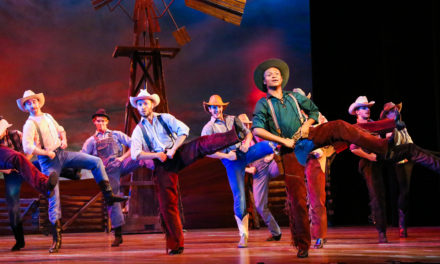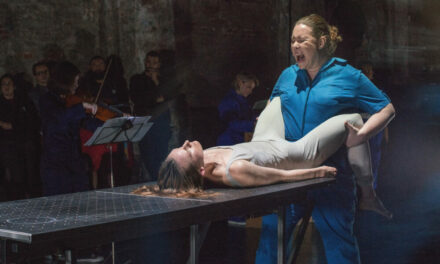Some performers were born to be on Broadway, and Eugene Ma could easily be among them: The 33-year-old director oozes the exceptional talent, high-octane energy, and infectious charisma that it takes to make it on the Great White Way. As fate would have it, he was even raised on Broadway, albeit the one that borders the massive Mei Foo Sun Chuen housing estate where he grew up. In that distinction lies an important key to understanding the trajectory of this aspiring enfant terrible of Hong Kong theater.
“I knew something was wrong when I had to just memorize shit in school and output it — dry cereal,” he says of his early interactions with Hong Kong institutions, in the take-no-prisoners tone that infuses his speech after years in New York’s theater industry. Over a nearly two-hour conversation with Ma in a tiny North Point coffee house, during which a steady stream of theatrical voices and gestures make him the center of attention, it becomes clear how that Big Apple chutzpah found fertile ground in his huge ambitions and even bigger personality.
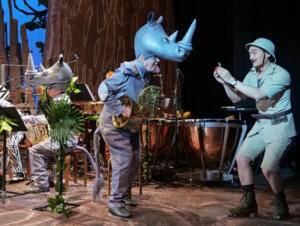
Scene of Wild, the musical directed by Eugene Ma in Hong Kong in 2022 – Photo courtesy CCOHK
Before the age of 10, Ma was an organ prodigy and composer at the Yamaha Music Foundation, fueling his imagination with Andrew Lloyd Webber DVDs and dreaming of blazing his way out of Lai Chi Kok. He describes himself as “very idealistic,” “scary” and “super intense”: qualities that pre-ordained him to be on stage. Nearly 20 years after immigrating to Toronto to attend a prestigious boys’ boarding school with a pre-professional drama program and 11 years after graduating from the Tisch School of the Arts at New York University, Ma has accumulated rave acting reviews, Ivy League teaching positions and a Rolodex of American theater luminaries.
He is also increasingly sought out in Hong Kong. Ma is home in June to rehearse the cast of WILD (The Musical), the City Chamber Orchestra of Hong Kong’s all-ages production, which he directed in 2022 and which will travel to the FUSE Festival of youth performing arts in London in early July. Written by CCOHK’s Founder and Artistic Director Leanne Nicholls, WILD sings a siren’s call of Broadway fame for its characters and its cast.
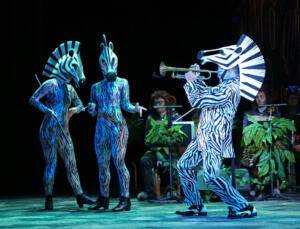
Wild will travel to FUSE festival in London – Photo courtesy CCOHK
Children thrill to the story of a gifted orchestra of animal musicians who are targeted by greedy poachers eager to sell them to Broadway producers. Adults can appreciate WILD’s showcase of 75 homegrown talents, including musical performer Jordan Cheng, operatic bass-baritone Apollo Wong, Four Gig Heads Percussion, and designer Yoki Lai, whose costumes transform CCOHK’s musicians into wonderful and mischievous monkeys, toucans, rhinos, tigers, zebras and even an oryx on electric bass guitar.
Nicholls’ vision was to write a cautionary tale for our pandemic age about the dangers of wildlife poaching for human health. Ma’s job, he says, “is to introduce chaos, so it’s not a boring motherfucking concert.” In more polite terms, Ma brings to WILD the stellar clown chops he learned during a two-year apprenticeship to Christopher Bayes, who is the Head of Physical Acting at the David Geffen School of Drama at Yale. “[Bayes’s] work blew my mind in the classroom early on. He got people to strip very bare and be very vulnerable,” says Ma.
For his acting, it was revelatory; praise like “brilliant,” “hilarious,” “adorable,” “stunning” and “show-stealing” is the norm, not the exception, in reviews of Ma’s performances at that time. Somewhat self-deprecatingly — though the tone is not typical in his repertoire — he calls that phase of his career his “fluffy, large, bouncy characters” stage, but it got Ma noticed by directors across the US.
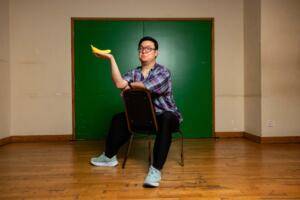
Photos by Onn Sek for Zolima CityMag
It also got him wanting something more in his career. “I was so drawn to the clown, the naïveté, because I have such belief in hope, and that we can use human agency to fix things, which I think is the theater drive.” But, he says, “I come from a very downtown taste,” referring to New York’s Off-Broadway theater world, whose leading directors populate Tisch’s faculty. Ma cites Rachel Chavkin of The TEAM and Mary Overlie, who created Tisch’s Experimental Theater Wing, among his greatest influences. “I was trained to have teeth!” he says, as shorthand for the non-text based, media-savvy postdramatic theater — what audiences might just call challenging or avant-garde — that he learned from them.
What happened next is what often does in the theater world: the phone rang. Ma was still just a few years out of Tisch with only a BFA in directing but he was invited to join the faculty of the Graduate Actor Training Program at Columbia. It was “a big deal for this kid from Hong Kong,” as Ma puts it.
10 years and a bout of pandemic-induced nostalgia for home later, Ma is expanding his reach as a pedagogue in Asia, where he advocates an East-West “third culture” approach. “Contemporary Asian voices are just not in conversation. It’s the butoh, the noh or the Chinese opera,” he laments of the West’s three operative categorizations of Asian theater, the first two referring to Japanese styles of performance. He says this stymies creativity among actors who think they have to conform to these traditional categories.
Ma is gradually building a following, training rising actors and the occasional boy band singer at Beijing’s Dome Studio, teaching as an artist-in-residence at Hong Kong Baptist University, and opening his own actor’s studio in Toronto, which will welcome this summer a cohort of some of his past Hong Kong students looking to further their training with him. “I am captivating the imagination of a tiny corner that’s quite fulfilling but it’s not adding up [financially],” he concludes of his efforts so far, although enrolment in his summer program has surpassed his expectations.
The term “third culture” describes people raised in a culture different from that of their parents or their country of nationality and implies both a heightened cultural awareness and a sentiment of not being wholly of the country where one lives or the one claimed on a passport. Ma’s third culture perspective is part of what differentiates his acting instruction from his peers’ but his years abroad also create challenges for him as a professional wanting to work again in Hong Kong.
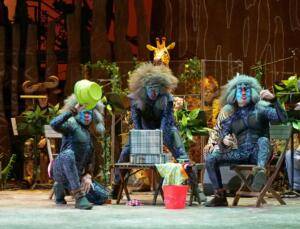
Wild the musical produced by CCOHK was first directed by Eugene Ma in 2022
During the pandemic, when theaters and universities were closed in New York and the performing arts world generally was in existential crisis, Ma briefly enjoyed a “dreamy time” here. He was invited into the city’s creative pantheon alongside the lyricist Chris Shum and composer Peter Kam to direct Hong Kong Arts Festival’s Yat-sen Musical — he later left the project when Covid cancellations forced the production into limbo — and he dared to believe that his Ivy League credentials would allow him to follow in the footsteps of Fredric Mao and Chung King-fai, who parlayed US training into leadership positions in Hong Kong in the 1980s.
“If I could teach at the top places there, which I don’t think anyone from here had ever done, I could probably change something here, right?” he remembers thinking. Ironically, it is in the famed epicenter of East-meets-West culture that Ma is finding the going toughest. He credits his “deep optimism” for getting him through “some terrible and toxic and very culty and provincial” experiences, and it keeps him going in his quest to break into Hong Kong’s hermetic theater ecosystem, where an APA degree is the only sesame that can open industry doors.
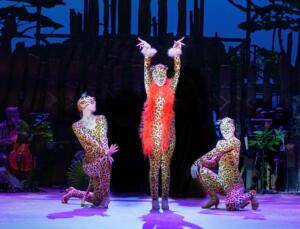
Photos courtesy CCOHK
“I don’t have an ego. I don’t care,” he insists of the resistance that sometimes counters his attempts to go against the grain here. “I get ultimate satisfaction in the classroom. [The students] know my vernacular, they’re chasing that thing. When the thing clicks…” He trails off, for once at a loss for words to describe the profound transformations that can happen in students when they encounter the acting training he learned and wants to disseminate.
But Ma does have his supporters in the Hong Kong theater scene. Nicholls says he was the right man for her vision of WILD. CCOHK may be Hong Kong’s most third culture arts institution, deeply mixed ethnically and led by the Australian-born, Cantonese-fluent Nicholls. “Eugene was the perfect person for this show,” she says, citing his understanding of North American and British musical theater. “He brings in energy, the ideas and he is after all from Hong Kong heritage.”
“In the industry, I’m contagious,” says Ma half jokingly, tempering that boast by adding that his primary question today in Hong Kong is, “How can I be most useful?” He is investigating creating a base of operations here on his own terms, starting with a building or at least a studio space that he can own outright, to concentrate on training actors without the demands of fundraising. “My confidence is back,” he says after the last few years’ setbacks and disappointments. “I’m on the verge of something deep.” Until he gets there, he pledges to weather all obstacles, meaning: “I have to be good enough to ignore all fucking voices.”
“I’m Hong Kong,” he adds, with a touch of playful menace, projecting his future success in the face of adversity. “I can adapt to anything.”
WILD (The Musical) premieres in London with three performances on July 6 and 7, 2023. Click here for more information.
This article was originally published by Zolima City Mag (https://zolimacitymag.com/). Reposted with permission. Read the original article.
This post was written by the author in their personal capacity.The opinions expressed in this article are the author’s own and do not reflect the view of The Theatre Times, their staff or collaborators.
This post was written by Molly Grogan.
The views expressed here belong to the author and do not necessarily reflect our views and opinions.

